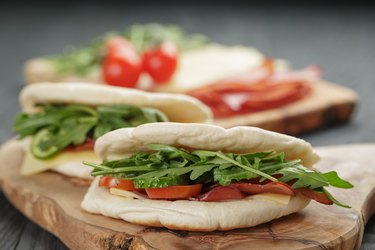
Your gallbladder is an often overlooked organ, unless something goes wrong. It plays a major role in helping your body digest dietary fat by storing and releasing a digestive juice known as bile. The only time you need to worry about what foods stimulate bile release is if you have gallbladder issues, which make it difficult to digest large amounts of dietary fat. To control your symptoms, your physician may recommend limiting foods that stimulate bile release.
Bile and Fat Digestion
Video of the Day
Bile is a substance produced by the liver. It travels through specialized ducts from the liver to the gallbladder for storage. When you eat, a complex set of reactions occur that facilitate digestion. If the food you eat contains dietary fat, it triggers a hormone that signals your gallbladder to release bile into your intestines. The resulting bile breaks fat down into smaller components your body can absorb. Bile aids in the absorption of fat-soluble vitamins as well.
Video of the Day
Problems With Bile Flow
A number of problems can arise that prevent your gallbladder from working properly. For example, hard deposits called gallstones can form and reduce or block the flow of bile. Gallstones have a number of causes; obesity, rapid weight loss and following a very low-calorie diet increase your risk. When you have gallstones, eating a fatty meal can cause pain when your gallbladder contracts to release bile into the intestines. Controlling your intake of high-fat foods helps control symptoms of gallbladder problems.
Foods That Trigger Bile Release
Any food that contains fat causes the gallbladder to release bile. The higher the fat content of the food or meal, the more bile is released. Restricting the amount of fat you eat limits gallbladder contraction and the release of bile, which reduces digestive discomfort if you have gallbladder disease. If you're in this situation, your doctor may recommend keeping your total fat intake to about 40 to 50 grams per day. Most people with gallbladder disease can tolerate this amount without problems, according to the Hartford Healthcare Medical Group.
Limiting Fat Intake
A fat-restricted diet reduces gallbladder disease complications and involves avoiding high-fat foods such as processed meats, fried or greasy foods, high-fat dessert foods, potato chips and full-fat dairy. On this eating plan, patients stick with fruits, vegetables, lean meats, low-fat breads, low-fat dairy and limited fat from sources such as peanut butter, nuts, olives and avocados. Patients are able to follow a normal diet after gallbladder treatment, which may include gallbladder removal.